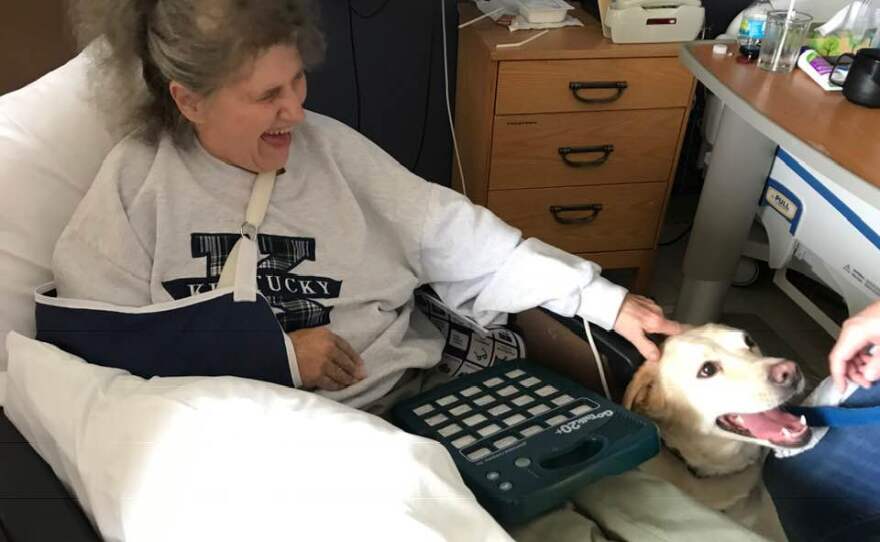Doctors aren’t the only ones on call at Hardin Memorial Hospital in Elizabethtown. So is man’s best friend.
A part Labrador Retriever named Baron; Pepper the Yorkie; Lola, a Rhodesian Ridgeback; and Lady, a German Short-Haired Pointer, reported for duty at the hospital on a recent Friday afternoon, and fanned out to patient rooms to offer some canine comfort.
The dogs make up the hospital’s pet therapy program known as PUPS, which stands for "Providing Unconditional Patient Support". Chaplain Jessica Jasper started the program for patients in palliative care and their family members.
“It helps the conversation," she said. "If you’re just a chaplain walking in, ‘Hello, I’m a chaplain and I’m sorry for your loss,’ a lot of people don’t open up as much. But you bring a dog in, they immediately start opening up."
Once Jasper saw success among patients with life-threatening illnesses, she launched the program hospital-wide, with a few exceptions.
Most dogs have the innate ability to offer a soothing presence and a sense of companionship. Jasper witnessed how a dog got a pregnant woman through a complicated and heart-breaking delivery.
“Her baby had passed away and she had been in labor for three days, because sometimes your body cannot relax and give the baby up. She was so tense," Jasper explained. "This dog comes in and sits down on the bed and as she is petting the dog, she relaxed enough to where she like, ‘I think I’m in labor, I think I’m going!’ The dog was actually sitting on her bed whenever she gave birth to the baby.”
Lab worker Allison Reed recently made rounds with her dog, Baron. She knocked on the hospital room door of patient Sharon Currens.
“Mrs. Currens, I’ve got a friend. Look who’s here," said Reed.
A stroke has left Currens unable to form words and communicate. She refers to Baron as the "mammal" and lights up at the first sight of him.
"The mammal, the mammal, the mammal," Currens exclaimed.
"Yes, he came back to see you," Reed said to Currens. “He remembers you."
Baron then left Mrs. Currens’ room and headed over to the coronary care unit where someone was waiting for him. For registered nurse Meaghan Baumgardner, visits from Baron are refreshing.
“This is literally the best part of my day every time," said Baumgardner. "This job is hard. There’s a lot of burnout, but the dogs bring joy even when there’s not a lot of joy to be had. Lint rollers are required and very good handwashing, but it’s totally worth it.”
Researchers from John Hopkins University released a study last year that said patients who spend more time with therapy dogs increased their risk of contracting the superbug MRSA. However, the patients’ risk fell by 90 percent when the dogs were bathed with anti-bacterial shampoo, and were wiped with disinfectant cloths prior to their hospital visits. Chaplain Jessica Jasper says Hardin Memorial Health has stringent rules to ensure the dogs are vaccinated and clean.
“Before the dog goes in, the dog has to be wiped down with doggie wipes to kind of bathe the dog so we’re not carrying infections to each patient," Jasper explained. "After the visit, the dog is wiped down, everybody gets hand sanitizers, and then our environmental service workers go in and mop the room.”
Dogs are currently prohibited from the intensive care unit, as well as isolation rooms, the nursery, and surgical rooms.
In addition to being clean and healthy, the therapy dogs are well-trained. Theresa Filino is the charge nurse in the emergency room at Hardin Memorial Hospital. Her dogs Pepper and Lady became certified therapy dogs last year.
“We had to teach them the command ‘leave it’ in case there’s a pill or anything on the floor of the hospital you don’t want them to touch," said Filino. "They had to walk through 200 yards of treats without picking up any treats, or else they didn’t pass.”
The dogs also have to work well with strangers, like patient Larry Beauchamp who recently met Baron for the first time.
“Mr. Larry, I hear you want a visitor today," said hospital employee Alison Reed as she entered his room.
"What do you got there?" Beauchamp asked.
"I have Baron," answered Reed.
Baron walked to his bedside and Beauchamp stretched out his hand.
"Here, boy. Come on boy," he said. "Are you a good doggie?
Baron began licking Beauchamp's right hand.
"You washing my hand, buddy," said Beauchamp.
Animal-assisted therapy does more than decrease anxiety and brighten spirits. ER nurse Theresa Filino said studies have shown that incorporating animals into healing can also improve vital signs.
“When they’re petting the dogs or the dogs are up close to them, we can see a decrease in blood pressure, a decrease in heart rate," explains Filino. "One of the biggest things that we see is a decrease in their pain. Most people after having the dog therapy would rate their pain lower than they would before the visit.”
The hospital is preparing to incorporate pet therapy into its pain management program. The dogs will supplement controlled substances often prescribed for patients with severe pain. Hospital staff are interested to see if pet therapy can, in any way, help curb the state’s rate of prescription drug abuse.
The dogs in the pet therapy program are just like any other hospital volunteer. They go to Human Resources, get their picture taken, and receive an identification card. The dogs also sport maroon vests with their name on the side. They make regular visits to certain departments and even make special visits on request.
Just like people, some dogs really have a purpose in their day.












